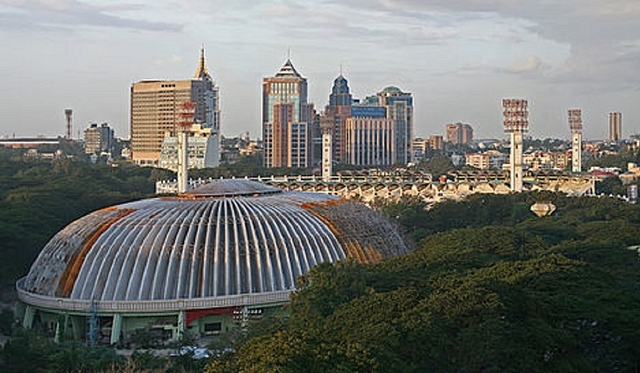
Can Bangalore be Governed? Begin Today
Almost a year after the Bruhut Bengaluru Mahanagara Palike (BBMP) elections, the Bangalore Development Minister has swung into action and created a Vision Group consisting mostly of corporate people in order to enhance the image of the party as well as win support of citizens of the City.
Despite Geographic Information System (GIS) mapping of all properties, collection from property tax has been dismal. Bangalore has now been rechristened as “Garbage City”, a far cry from its famous sobriquet “Garden City”..
A silent majority of citizens of Bangalore are grappling with an omnipotent question – Can the city be governed?Almost a year after the Bruhut Bengaluru Mahanagara Palike (BBMP) elections, the Bangalore Development Minister K J George swung into action and created a Vision Group consisting mostly of corporate people in order to enhance the image of the party as well as win support of citizens of the city.
Over the past decade and a half, there have been a myriad of problems highlighted with no amicable long term solution. Despite Geographic Information System (GIS) mapping of all properties, collection from property tax has been dismal. Bangalore has now been rechristened as “Garbage City”, a far cry from its famous sobriquet “Garden City”.
Dog menace continues to take lives of innocent boys and girls. Affordable schools and hospitals providing outstanding education and health care are scarce. Land grabbing has been rampant with lakes and Civic Amenities sites converted for residential purposes by an all pervasive land mafia. And traffic snarls around city is a common sight.
There is no doubt that governance of Bangalore has been a spectacular failure. Rapid urbanization, poor planning and inefficient management have squeezed the tax payer and depleted the resources. Financials lack transparency and administration is far away from accountability. The civic body is mired in debt and was forced to mortgage the prestigious Krishna Rajendra Market to avoid bankruptcy.
Self interest of politicians scores over the needs of people while conceiving projects. Citizens are clueless about who is in-charge – State Government or the Mayor and City Council or the bureaucracy led by BBMP Commissioner?
If current trends are extrapolated, a dystopian scenario emerges over the next decade. Migration of rural poor and increase in population could lead to a 50 percent increase in city dwellers. There are ominous predictions about water and electricity shortages creating havoc. Affordable housing, already a challenge, will only get worse. Crime is on the rise and so are suicides.
Slums could double and along with it unsanitary living conditions for many. Stress on the City infrastructure is already high and more private vehicles are bound to clog the roads and create further traffic chaos.
What does it take to transform Bangalore and regain its lost glory? Intellectuals and Urban Planners often think about large cities like New York, London, Paris and Singapore when it comes to conceiving policies for the City. This thinking is deeply flawed since these cities are exceptions. Most livable cities across the globe have a population of less than five million and it is best if citizen count of Bangalore be reduced by either moving government business or large companies out of City. Unfortunately there is no political will for such radical thinking.
A good alternative is to implement structural reforms that will benefit not just Bangalore but municipalities all over the state. And policy must be incentivized and enforced to get necessary co-operation from citizens.
Transformation exercise must start with an administrative and fiscal decentralization plan. One without the other is like a bird without wings. It cannot fly. Currently there is an asymmetry in the system between political, administrative and fiscal responsibilities. While there is an elected Mayor and City Council, administrative and fiscal powers largely rest with the state government which diligently exercises it through the bureaucracy.
Hence, the state must prepare a blueprint for a direct mayoral election at the end of the current Council term. BBMP must be granted the autonomy in decision making to deliver the required basic civic services to citizens.
Financial resources must be supplemented along with administrative independence with a legally binding yearly transfer to BBMP corpus fund or giving the local body sufficient powers to enhance its revenue raising capabilities to impose a surcharge on road tax, professional tax, petrol and diesel tax. For better execution and improving efficiency, all service providing agencies must come under one roof.
The government must also ensure that it has the courage to apply existing and new laws. And if there is a carrot and stick policy, it must deliver as promised. A glaring failure has been the implementation of rain water harvesting (RWH) policy as was proposed.
The government was delivering sermons every day in year 2011 that it will enforce a strict disconnection drive on failure of residents to install rain water harvesting structure. It allowed the deadline to pass without any action and also backtracked on the promise of giving property tax benefit to those residents who had installed RWH structure.
Such kind of non-action fooled law abiding citizens while rewarding residents who ignored the deadline. Thus when segregation of garbage policy was announced citizens totally disregarded the call knowing with certainty that government will most likely not implement the act. Similarly Karnataka Municipal Corporation Act allows a revision of property tax rates every three years that is completely ignored due to political compulsions.
The time for a strong action plan to transform Bangalore is now. Delaying will only lead to more trepidation and push the city into the very edge of precipice. A concerted effort by everyone involved can alter the course and change Bangalore into a heavenly place rather than a living hell.